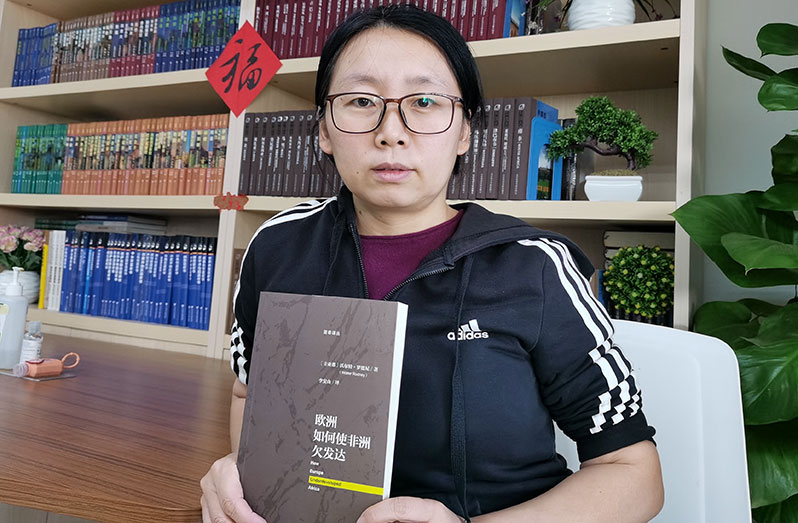
By Samuel Sukhnandan in Beijing
This year marks 50 years since Dr. Walter Rodney’s ground-breaking book, How Europe Underdeveloped Africa (HEUA), hit bookshelves and received wide acclaim. Today, this research analysis of the abiding repercussions of European colonialism on the continent of Africa continues to be studied.
But the book has gained even greater attention globally over the past few years, especially among scholars and universities offering African Studies courses. In fact, HEUA is now available in six languages, including English, French, Spanish, Japanese, and Armenian, with the last being Mandarin. The book was republished by Verso Press in 2018, with plans to produce the text in other languages.

Vice Director of the Global and Regional Issue Publishing Center of the Beijing-based Social Science Academic Press (SSAP), Ms. Goa Mingxiu, stated that the book was recommended by Professor Li Anshan, a renowned Chinese professor of international studies and President of the China Association for African History Studies, as early as January 2013.
BIBLE OF AFRICANS
Professor Li told the SSAP that HEUA, together with “Capitalism and Slavery,” written by Trinidadian politician Eric Williams, was called the “Bible of Africans.”
Mingxiu said that was the initial impetus that moved the publishing company to introduce and publish the book, which was written by Dr. Rodney, a late Guyanese scholar, political activist, and historian.
“Subsequently, the publishing house decided to introduce the book to Chinese readers after a discussion, mainly for two reasons: one is Dr. Rodney’s influence, and the other is the significance of how Europe underdeveloped Africa,” she said.
Another important reason for the publication, according to Mingxiu, is that Professor Li agreed to translate the book. Given Mr. Li’s expertise in Sino-African relations, African studies, and the history of Chinese overseas in Africa, she was confident in publishing HEUA with his support.
She added: “His profound knowledge and rigorous style of study ensure the quality of the book and ensure that Dr. Rodney’s views are accurately transmitted to Chinese researchers.”
More importantly, it reflects the concern of the Chinese-African academic circles represented by Professor Li Anshan for Africa’s development.
“How Africa can better embark on its own development path is also a concern for Chinese intellectuals in developing countries,” Mingxiu related.
The book seeks to answer the historical roots of poverty in Africa. It is dubbed an economic analysis of how Europe engaged in an unequal relationship with Africa and subsequently exploited the continent, specifically how this form of colonialism differed from other parts of the world.
GROWING INTEREST
Since its publication in 2017, Mingxiu said the 1,914 copies of the book have been sold in China, which is not the number of best-sellers. However, as a serious academic publication, she said plans are being made to ensure that every comprehensive university and library in the country has two to three of these books, which can basically meet the needs of researchers.
Further, on China’s “douban.com,” this academic circle pays the most attention to the niche website, and from the book’s point of view, there are many discussions. In addition, the publisher has also launched an electronic version of the book, which has received tens of thousands of hits, indicating that more and more researchers in China are beginning to pay attention to Dr. Rodney and the book.
For the last 40 years, the African continent is where HEUA has been most widely read, according to Dr. Patricia Rodney, the wife of the late Guyanese scholar, and chair of the Walter Rodney Foundation. However, she said it is also widely used in many United States (US) universities with programmes in African and African American studies.
At present, the foundation also collaborates with a number of US universities and holds an annual Walter Rodney symposium and a Walter Rodney Speaker Series, a semester course that focuses on Dr. Rodney’s scholarship. The Foundation, she said, is always open to further collaborations with other colleges and universities beyond the US.
Dr. Rodney was an internationally acclaimed author of six scholarly books and numerous academic articles that documented the devastating effects of slavery and imperialism in Africa and the Caribbean, but HEUA is his most critical work.
His foundation was Marxist ideology centred on the working classes. By combining political economic analysis with archival research, he demonstrated how colonialism resulted in economic inequality and racial and ethnic divisions, and how neocolonialism continued those damaging effects.
From 1966 to 1967, he taught at the University of Dar es Salaam, Tanzania. In 1968, he taught at the University of the West Indies at Mona. He then returned to Tanzania to teach at the same university from 1969 to 1974 before accepting the offer of a professorship at the University of Guyana.
On June 13, Dr. Rodney was killed by a bomb blast in Guyana. More than four decades after his murder, the National Assembly in 2021 accepted the findings of a major commission of inquiry launched by the People’s Progressive Party (PPP) government into his assassination.
It was concluded that the then Prime Minister Forbes Burnham administration had organised the murder, which was perpetrated by an active-duty sergeant in the Guyana Defense Force, Gregory Smith.
RICH LEGACY
Today, Dr. Rodney’s work and teachings continue to live on in all corners of the world, particularly in Africa and the Anglophone Caribbean. The Irfaan Ali-led government has also taken steps to preserve Dr. Rodney’s rich legacy.
The Rodney Gravesite and Memorial are currently being managed collaboratively between the Rodney family and the National Trust, but the government intends to have it declared a national monument.
The books he wrote will be placed on the national syllabus by the Ministry of Education and in the hands of primary and secondary school students across Guyana.
Additionally, his other major works, including A History of the Guyanese Working People, Guyanese Sugar Plantations in the Late Nineteenth Century, and HEUA, will be made available to the library of the University of Guyana.
The Walter Rodney Chair at the University of Guyana will also be re-established, while the National Archives of Guyana has already been renamed the Walter Rodney Archives.




